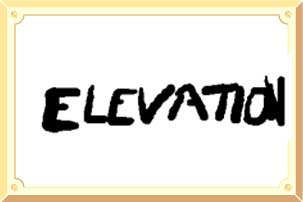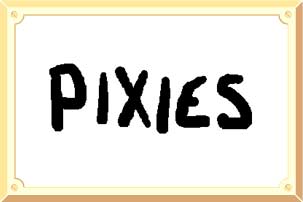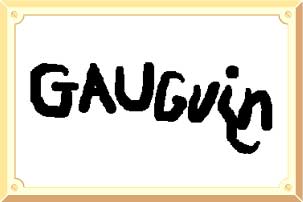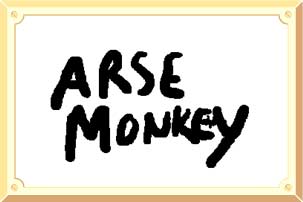Art
One of the more controversial artists of recent years is Guy Parker, the latest enfant terrible to disrupt the art scene and divide opinion with his radical and shocking new interpretations of form and content. Parker first came to our attention four years ago when he quite literally set the art world ablaze by torching the National Gallery in an installation entitled simply 'Pyromania'. More recently he simultaneously caused outrage and astonishment by displaying his bollocks at the Tate Modern. In his latest work, which has been nominated for this year's Turner Prize, he has surprised everybody by bucking the trend for bucking the trend and produced a markedly less newsworthy 'event' - a series of paintings entitled 'Wordpictures'. We sent along our arts correspondent, Selwyn Peach, to talk to Parker about this new work.
Selwyn Peach
Guy, thank you very much for allowing us this opportunity to speak with you. Your new 'Wordpictures' exhibition would seem to represent a deliberate shift in style - a decidedly less vociferous and, indeed, less incendiary approach. How would you describe the collection?
Guy Parker
Well, I think the title kind of sums it up pretty well, actually. It's a series of pictures of words. If you like, it's 'words' in 'pictures'. What I'm basically driving at here is that it's a sort of word-picture kind of deal. Words in pictures - pictures of words. We're talking words, we're talking pictures, and we're talking about a combination of the two.
Selwyn Peach
I see, I see. So, essentially what we're driving at here is that it is 'Words in Pictures'.
Guy Parker
I don't think I could have put it better myself.
Selwyn Peach
Wonderful, wonderful. And in doing this, one presumes your intention is to heighten the meanings of these words, so that by isolating them you throw their definitions into sharper relief. You increase the power of language by taking it out of the normal, everyday context in which we take it for granted and lock it within the borders of the picture.
Guy Parker
Something like that, yes.
Selwyn Peach
Of course, of course. So paradoxically, by confining language in this fashion you are in fact setting it free. You could say that because it is liberated, it therefore becomes more meaningful, more significant, more effective. This is language with a capital 'L'; words rendered in bold type.
Guy Parker
Yes, you could say all of those things, if you like.

Selwyn Peach
Gorgeous. Well then, let's take a look then at the first example of these 'Wordpictures', as you have so intuitively titled them. This one is called simply 'Elephant'. A curious title: what does it signify?
Guy Parker
I like to think that it signifies what it actually is. By 'elephant' what I basically mean is 'elephant'.
Selwyn Peach
Astonishing, absolutely astonishing. It is the simplicity which is so refreshing. The simplicity and the honesty. And the boldness of it. The simplicity and the honesty and the boldness - that's what is so wonderfully striking. When I look at this picture, do you know what I see?
Guy Parker
Elephant?
Selwyn Peach
Yes, yes. That's it exactly! I see 'elephant'. Not just the word, not just the bold strokes upon the canvas. But I truly see 'elephant' and all that the word conveys.
Guy Parker
A big grey thing with tusks?
Selwyn Peach
Exactly. Because what we have here is something real, something solid and yet depicted as nothing more than a series of arbitrary symbols on a piece of canvas. I suspect that it was your intention to demonstrate the futility of art itself; its inability to properly convey the profundity of reality.
Guy Parker
Yeah, I'd go along with that. Also, I quite like elephants.

Selwyn Peach
Lovely, lovely. So, moving on to the second in the series - 'Elevation'. Here we clearly note the progression from a material object to an abstract concept. Now the viewer is at far greater liberty to place his or her interpretation on the work. When we see the word 'elevation' do we consider that we are somehow putting the artist on a pedestal, or is it ourselves that we are elevating? And yet, you offer us a clue. The word is curiously bunched up at the end, almost colliding with the very edge of the picture.
Guy Parker
I hadn't left myself enough room to write it.
Selwyn Peach
Exactly! Exactly! And isn't that what we're all doing, in our own way? We're all, somehow, squeezing those last letters in, aren't we? We're all writing right up to the edge of the canvas. Time is running out, space is collapsing in on us. We see this picture and we realise how trapped, how limited we are in spite of our aspirations.
Guy Parker
Yeeeees...

Selwyn Peach
And so to 'Pixies'. Ha, ha! Now, you'll have to forgive me for beaming like a simpleton as we view this picture, but I must confess that it is my absolute favourite. I simply adore the whimsy and the lightness of touch with which you approach the subject matter. There is something so delightfully enchanting about 'Pixies', it quite takes my breath away. Nowhere is your stark, simplistic style so effective. Could you tell me something about the background to these pictures?
Guy Parker
The background?
Selwyn Peach
Yes, yes, what lies behind these extraordinary images?
Guy Parker
Not sure I understand the question. There's no background, I just left it white.
Selwyn Peach
White! And what could possibly be a more evocative setting for your subject? White, blank, void - like all truly great artists you give us space to breathe, to contemplate the meaning, and thus your powerful message is not lost. I'm fascinated also by your use of colour. The pictures are all rendered in the same strong black strokes, presumably in order to give the entire collection that essential element of cohesion.
Guy Parker
Yes. And because I only had the one marker pen.

Selwyn Peach
Enchanting, absolutely enchanting. But onward, and it seems that just when we thought we had the measure of this collection, along comes the delightfully satirical 'Gauguin' - an extraordinary example of art deliberately commenting upon art itself. In this instance the form is corrupted, with the strange elongated letter 'i'. This - and we are left in no doubt - is what happens when modern art clashes headlong with traditionalism.
Guy Parker
Actually, this is what happens when the bastard cat pounces on your shoulder whilst you're trying to work. Spilt my coffee as well.

Selwyn Peach
Good, good. Good, good. Imperfection. We are all, are we not, born of bubbles in space, deformities in the fabric of reality? We are all just spilt coffee in the vacuum of eternity. And it is this theme which is continued in the penultimate painting, 'Beutifull'. Here, all promises of beauty, elegance and flawlessness are dashed. The word is misspelled...
Guy Parker
Is it?
Selwyn Peach
...our hopes of utopia fade away, the ideals for which we strive fall on stony ground...
Guy Parker
Now you come to mention it, I thought it looked a bit wrong.
Selwyn Peach
...and we are left with nothing. It is both tragic and magical, filling us with both elation and despair.
Guy Parker
Despair, yes.
Selwyn Peach
For in all these paintings the message is stark and clear.
Guy Parker
Oh decidedly. I couldn't agree more.
Selwyn Peach
You are telling us that we are living in a world where we have exchanged symbolism for reality.
Guy Parker
If you say so.
Selwyn Peach
That we cloak ourselves in artificiality, confound ourselves with signs and ciphers and conveniently forget objective experience.
Guy Parker
Hang on, let me write all this down. We can use it in the catalogue.
Selwyn Peach
But ultimately there is a real world out there. A world that exists without the need for us to react with it. It's a beautiful, frightening, dangerous, magical world. Your work reveals the existence of this world to us and informs us of our place within it.
Guy Parker
Oh yes.
Selwyn Peach
And there are none so blind as those who will not see it
Guy Parker
Oh certainly. Moreover, there are none so deluded as those who see what isn't there.
Selwyn Peach
Well yes, yes, yes...
Guy Parker
Yes...
Selwyn Peach
Well... Guy Parker, let me thank you very much for joining me today. We will finish by contemplating the final picture in the series. Thank you very much.
Guy Parker
It's been a hoot.


















